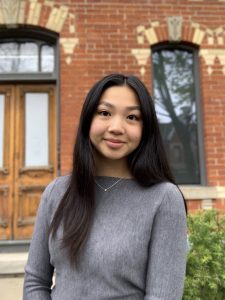Astrid Ling is a third year PCJ student. This fall, as part of PCJ499, she served as a Research Intern at The Mosaic Institute.

Last semester, I had the opportunity to intern at The Mosaic Institute – a think-and-do tank dedicated to dialogue, pluralism and conflict resolution. For three months, I researched multiculturalism policies around the world in anticipation of the 50th anniversary of Canada’s multiculturalism policy this year. Although I gained a lot of specific policy knowledge, I most enjoyed working with my research partner and our supervisor and getting to know Mosaic’s work from the inside out.
Our main task was to comparatively analyze multiculturalism and diversity policies among different nations. We limited our scope to twelve countries, two per habitable continent, and assembled our criteria based on Canada’s trailblazing policy, examining factors like constitutional protections, affirmative action policies, civil society initiatives and international commitments.
Each of the countries’ policies are fascinating in their own right – influenced by their unique history, geographic location, immigration patterns and ethnic makeup, among other factors. I found it most interesting to learn about the groups that were targeted by diversity protections and the history behind their marginalization. Having learned about different theories of conflict in PCJ260, I got to explore specific examples through my research. A memorable example is the tension between Malaysia’s three main ethnic groups and the way it plays out in their economic sphere.
On the other side of these issues, we explored the policies that aim to remedy them, contemplating policy as a tool for peace and justice. Although we were focused on policy goals rather than monitoring compliance, there were clear patterns among the different approaches. While some policies were ambitious, others could be described as reactionary and even reluctant. We also saw patterns regarding the actors leading diversity promotion efforts and classified these efforts as either top-down or bottom-up. There was so much to discuss by the end of the term that we ended up submitting a 71-page briefing note. The note was anything but brief and we learned not to leave citations and endnotes to the last minute.

The many experiential learning opportunities presented by PCJ are unique and my favourite aspect of the program. I have gotten to work on several cool, relevant real-life projects, learn about the special issues pertaining to them and collaborate with passionate and talented people who inspire me. My fellow PCJ intern, Michael, was a diligent researcher and sophisticated writer, in addition to being a great research partner. He introduced me to new writing structures and vocabulary, and I like to think that I am a better writer for it. Our supervisor, Rachel, was flexible, organized, understanding and a colour-coordinating pro. From her, I take away an appreciation for leadership grounded in flexibility, kindness and good humour.
I would like to thank Rachel and the Mosaic team for their trust, mentorship and important work, and the PCJ team for this special opportunity.